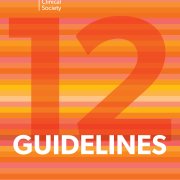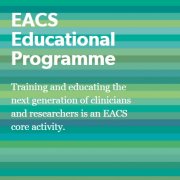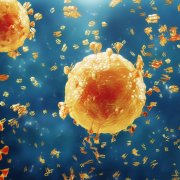Interview on the International Day of Action for Women’s Health with Dr. Karoline Aebi-Popp
On the occasion of the International Day of Action for Women’s Health, whose aim is to advocate for a better response to the existing gaps in the area of women’s health, the European AIDS Clinical Society (EACS) secretariat interviewed Dr. Karoline Aebi-Popp. Karoline Aebi-Popp is a consultant obstetrician-gynecologist, working as a researcher in the Department of Infectious Diseases at the University Hospital Bern, in Switzerland. She has been actively involved in the design and conduct of many clinical studies in the field of HIV and women. Currently, she is Chair of the EACS initiative promoting the welfare of HIV-positive women in Europe, which is called “Women Against Viruses in Europe (WAVE)”.
Why is it necessary to address gender in the global HIV response?
Women account for approximately half of all people living with HIV worldwide but the percentage of women who are living with HIV (WLWH) varies widely among countries. The most common way of HIV acquisition in women is heterosexual sexual contact, and several factors increase the risk of HIV in women during vaginal or anal sex. However, women are frequently underrepresented in clinical studies regarding antiretroviral therapy, and sometimes studies might not be applicable in terms of gender issues such as drug side effects or the impact of intimate partner violence on adherence. In addition, women are more likely to face stigma in terms of disclosure of their status and if they want to have children. WAVE advocates for gender-specific topics.
What is WAVE currently doing for the welfare of HIV-positive women in Europe?
One great thing about WAVE is that it involves an international group of both healthcare professionals of different areas and community representatives collaborating to endorse equality of access and standards of care for WLWH. For example, we focus on new opportunities like breastfeeding of WLWH in high resource settings and PrEP as a prevention strategy for women. With studies and results from our international working groups, we aim to support research on women-specific topics. Moreover, WAVE is committed to building educational programmes in different settings like workshops, face-to-face exchange meetings, and in the future, as a response to the COVID pandemic, live online workshops will be available. With the highest number of new infections occurring in Eastern Europe (50% in women), WAVE’s major focus for educational programmes remains in Eastern and Central European regions. The strong links between a medical society, practitioners and the community allows WAVE to promote research in key areas (including but not limited to: HIV Testing and Combination Prevention, Sexual and Reproductive Health, Breastfeeding and Pregnancy, Coinfections and Comorbidities, Menopause and Ageing, HPV related cancers) and makes it sustainable.
Another important activity carried by WAVE is giving recommendations on the European Treatment Guidelines and providing expert-level opinion whenever there are gaps in evidence.
According to WHO data, for a great number of women in Europe, especially for those in their 40s, late diagnosis is still a persistent issue. What are the main barriers that prevent women from accessing HIV testing? What could be a possible way to tackle the issue?
Women are indeed generally diagnosed with HIV later than men. We are convinced that somehow current testing strategies in Europe are failing women and older adults. One aim would be to diversify and complement HIV testing opportunities, for example during a gynecological check-up actively offering an HIV test to women. Opportunities to test women are often missed highlighting the need for gender-sensitive counseling and testing, including information about sexual health adapted to the needs of women to increase the awareness of what is a risk for HIV. Increased variety of services offering HIV testing to women, in both local and specialist medical services, such as gynecology, would also improve testing in women.
Why is it important to test for HIV during pregnancy?
HIV testing is the key to prevent vertical transmission of HIV to the baby. HIV testing should be a standard of care but with the option to opt-out. Sometimes a second HIV test during the third trimester based on a risk assessment, even in areas of low HIV prevalence, should be considered. All women in labor whose HIV status is unknown should undergo rapid HIV testing, as available interventions can still decrease the risk of perinatal transmission even around the time of delivery. If no measures are taken HIV is transmitted in about one-third of mothers to their babies, which compares to women taking antiretroviral therapy throughout their pregnancy, where their babies are very likely to be healthy. This has been a great success in terms of prevention of vertical transmission.
What is the impact of age-related conditions and comorbidities in women living with HIV (WLWH)?
We think that key contributors to increased morbidity and mortality for older women with HIV include limited health care, lack of resources, and the caregiving role. In addition, we observe gender-related omission from research and prevention programmes. Certain subgroups of women are more vulnerable to these barriers and ongoing capacity building to ensure higher standards of care for vulnerable groups of older women living with HIV is needed. WAVE addresses this topic in one of its working groups.
Central and Eastern Europe are facing a constant rise of new HIV infections every year, with Ukraine having the second-largest HIV epidemic in the region. What is the WAVE plan in Eastern and Central Europe for WLWH?
WAVE organised a workshop in Kyiv last year, under the auspices of the Gromashevsky Institute of Epidemiology and Infectious Diseases, Academy of Medical Science of Ukraine. The objective was to share knowledge and discuss women-related topics concerning HIV and pregnancy, STIs, and hepatitis. One part was of the workshop clinical reflecting EACS standards of care as well as guidelines related topics, and the second, but not less important part, was to explore the current situation in Ukraine to improve women’s access to care and to fight stigma. In order to give access to the workshop to all Ukrainian HIV specialists who were interested in it, the workshop was translated from English to Ukrainian simultaneously. This created the opportunity of meaningful and much-awaited exchange when we launched the presentation and case discussions. One of the keys to its success was allowing enough time for question and answer sessions. We have also kept in contact with the Ukrainian HIV specialists after the workshop. Out of our discussions was born the plan to continue with this educational programme composed of workshops, live online events, and digital content in Ukrainian, as well as peer-to-peer visits of young doctors in a WAVE clinical/research center. We support research in the Eastern and Central European regions and encourage members across these regions to be part of WAVE.

20th European AIDS Conference
15-18 October 2025 Paris, France

EACS Guidelines updated
The EACS 12.0 and the app are available for free on

Educational Programme
Training and educating the next generation of clinicians and researchers is an EACS core activity.

EACS Resource Library
Access all scientific content of EACS core activities! (members only)
